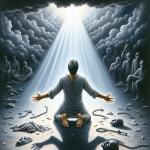
Having completed undergraduate studies at the University of California at Berkeley and earned his doctorate in molecular biology at Caltech (the California Institute of Technology), Douglas Axe next did post-doctoral work at Cambridge University, where he was eventually appointed to a position as a research scientist. Here are some additional notes from his book Undeniable: How Biology Confirms Our Intuition That Life Is Designed (New York: HarperCollins, 2016):
Now, if you’re wondering whether it’s legitimate for scientists to hope for a particular result when they set their goals, I can assure you that it is. We do this all the time. The search for extraterrestrial intelligence is a well-known example. SETI involves the work of many scientists who hope their search will one day prove successful. They have no proof, but science never starts with proof. Like every other worthwhile undertaking, science starts with ambition. The same could be said of the many scientists who devote themselves to finding cures for various diseases. There is no proof that these long-sought cures will be found, but the goal and the ambition are there, and this is no small thing. Scientific proof never comes without those key ingredients.
Harm comes to science not by people hoping to find a particular result but by people trying to suppress results that go against their hopes. (44-45)
Then he writes something that at least a few readers will not have expected:
When we consider who has the power to suppress unwelcome results, we see right away that the view most likely to cause suppression is the majority view of the scientific community. (45)
Some pages later, on a different but not wholly unrelated theme, he writes about “the systematic devaluation of human life” (54):
[Y]oung people who innately know themselves to be the handiwork of a “God-like designer” are indoctrinated with the message that they are instead cosmic accidents — the transient by-products of natural selection. (54-55)
He cites, as an example of this, the teaching of David Barash, a professor of psychology at the University of Washington. Every year, he teaches two hundred undergraduates in a course on animal behavior:
With professorial authority, he declares to his young captive audience, “The more we know of evolution, the more unavoidable is the conclusion that living things, including human beings, are produced by a natural, totally amoral process, with no indication of a benevolent, controlling creator.” (55)
Now, Dr. Axe believes this conclusion to be arguably and perhaps demonstrably untrue. First, though, he reflects on the potential consequences of accepting it as true:
Contemplate for just a moment the dystopian vision of a generation of human beings believing in their hearts that they are nothing more than bestial accidents fending for themselves in a world where morality is a fiction, and you begin to grasp the true stakes. (55)













